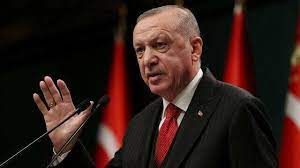Renat Abdullin
Ankara, which for a long time hampered the applications of Sweden and Finland to join NATO, raised the stakes again. After the provocation in Stockholm, the Turks do not want to give the Swedes the green light at all. But the last word has not yet been said – the parties have taken a timeout. RIA Novosti figured out how everything could end.
Who is behind the provocation
In January, a wave of disparate anti-Turkish pro-tests swept across Sweden. Ankara was particularly indignant at the action in Stockholm in support of the Kurdistan Workers’ Party, recognized as terrorist in Turkey and a number of other countries. After an emotional rally, the head of the far-right organization Stram Kurs (“Hard Course”), Danish lawyer Rasmus Paludan defiantly burned the Holy Quran.
He had done this before, in Denmark. Having recei-ved a stone on the head from a Syrian emigrant, he moved to Sweden. Now he has Swedish citizenship.
The rally in Stockholm was approved by the authorities. Turkish presidential spokesman Ibrahim Kalin said it “encourages hate crimes and Islamophobia.” As a result, the Dane’s trick turned into another Turkish-Swedish aggravation.
Forced pause
“The heinous act committed in Sweden is an insult to all who respect basic human rights, including the rights of Muslims,” Turkish President Recep Tayyip Erdogan said. According to him, now Stockholm will not receive from Ankara “any support regarding NATO membership.”
The visit of Swedish Defense Minister Paul Jonsson scheduled for January 27 has been cancelled. There is nothing to talk about with Stockholm now, the situation is “going backwards,” Ankara noted.
Finland, which applied to NATO together with its neighbors, tried to defuse the situation. Foreign Minister Pekki Haavisto announced on January 23 that he continued contacts with his Turkish counterpart Mevlut Cavusoglu. But it takes time for “passions to subside.” “I think the negotiations in a trilateral format with Turkey will be suspended for a couple of weeks,” the diplomat suggested.
Asked if Finland is ready to move into NATO without Sweden, Haavisto replied that he would prefer a “paired” option. However, Helsinki is also ready for a change in strategy. Ankara and Stockholm are very far from compromise. “The Turks want what we can’t or don’t want to give them,” Swedish Prime Minister Ulf Kristersson admitted earlier.
Waiting for the elections
There is another important circumstance. Erdogan officially confirmed that the presidential elections in Turkey will be held on May 14 (before that it was about June).
For him, opposition to the dictates of NATO, the PKK and Sweden that supports it is part of the election program. Last year’s polls showed that the president’s rating was falling mainly due to claims of “bending” under the US and the EU. Therefore, Erdogan does not need any concessions until May.
America and Europe are also waiting for the Turkish elections and, obviously, they hope for a change of power. However, Erdogan’s defeat is not visible yet.
It is clear that in any case, they will continue to put pressure on Ankara, seeking to unblock the Swedish and Finnish applications. In addition, the United States has several trump cards up its sleeve.
American lever
Washington is discussing the possibility of selling F-16 fighter jets to Ankara. The deal was frozen in 2020.
According to The Wall Street Journal sources, Congress will approve this if Ankara allows Finland and Sweden to join NATO.
It is assumed that the Turks will receive 40 fighters, missiles and other ammunition. The amount of the contract is 20 billion dollars.
In the meantime, the White House is coaxing A-nkara diplomatically. Secr-etary of State Anthony Bli-nken and Turkish Foreign Minister Mevlut Cavusoglu met in Washington. The American praised the partners for mediating the grain deal and pointed to the immutability of the allied relations between the two countries.
“This does not mean that there are no disagreements, however, when they arise, we overcome them in a partnership spirit,” Blinken added.
Cavusoglu, in his resp-onse, did not mention Fin-land and Sweden, but noted the importance of the F-16 contract: “As we have said, this applies not only to Tu-rkey – both NATO and the United States. This is in our common strategic interests.”
The joint communiqué states that the parties “discussed the strengthening of the defense partnership, including the modernization of the Turkish F-16 fleet”, “underlined the mut-ual commitment to expand the alliance with qualified candidates”, reaffirmed the desire to “strengthen NATO coordination and solidarity in the face of current threats and challenges”.
Raising rates
In addition, the Turks are striving to return to the F-35 fifth-generation fighter development and supply program, from which they were excluded for purchasing Russian S-400 anti-aircraft systems. Here, too, there are shifts.
This was discussed in Washington in January by representatives of the US and Turkish defense ministries. A year ago, there was no talk of Ankara’s return to the program at all.
“Six F-35s are already in the hangar for us,” the head of the military department, Hulusi Akar, assured journalists from the Turkish Millet newspaper.
The next NATO summit will take place in six months. And there, the alliance would like to appear before the world together with Sweden and Finland – to demonstrate the publicized “open door policy”. The question is whether the Americans will have time to pay Turkey an acceptable price for Ankara in order to avoid reputational losses.







